Part 2 - Results
and table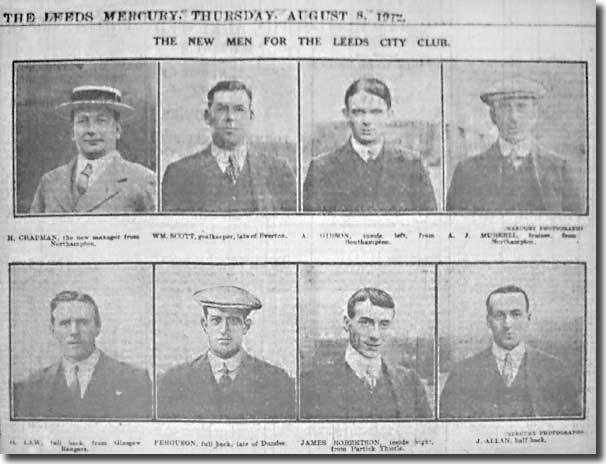
For Leeds City, the spring of 1912 was a miserable time, with the club
forced to apply for re-election as it sank ever deeper into the financial
mire. Secretary-manager Frank Scott-Walford
resigned his post in March, ground down by a constant struggle to keep
the club afloat. Two months later, after failing in an attempt to secure
the services of Woolwich Arsenal manager George Morrell, the board announced
that Scott-Walford's successor would be Herbert
Chapman, his growing reputation founded on the wonderful job he was
doing at Southern League Northampton Town.
Chapman, born on 19 January 1878 in Kiveton Park, Sheffield,
spent his playing days as a nomadic inside-forward doing the rounds
with Stalybridge, Rochdale, Grimsby, Swindon, Sheppey United,
Worksop, Northampton, Sheffield United, Notts County and Tottenham,
for whom he was leading scorer in 1905/06. Northampton appointed
him player-manager a year later and he proved an outstanding success,
leading the club to the Southern League title in 1909 a few months
after playing his final game for the club.
The appointment was a real feather in the cap for the City directors;
the Athletic News commented, 'Leeds City can congratulate themselves
on securing such a man as Mr Chapman.'
He was to become English football's most successful and celebrated
manager of the next two decades, but his great years were still
ahead of him. For now, he was an untested novice. Leeds City chairman
Norris Hepworth had been impressed by Chapman's success at
Northampton; the two men hit it off immediately, sharing a vision
of the future that had City soaring to the pinnacle of the English
game.
Chapman spoke with confidence following his appointment, 'I am here to
get Leeds City into the First Division. It is, of course, a matter of
time, but if it is humanly possible, it shall be attained.'
Before any such ascent to greatness could begin, though, the club's league
status had to be secured; everyone connected with Leeds pulled out all
the stops to ensure City were re-elected when the time came for the vote
at the League's AGM in London on Monday, 3 June 1912.
Seven other clubs were in the running for the two places on offer:
Gainsborough Trinity (the other club seeking re-election), Cardiff
City, Chesterfield Town, Darlington, Doncaster, Lincoln City and
Newcastle City.
Leeds vice-chairman Joe Henry was in attendance to put the Peacocks'
case, and he did so with assurance, saying they were 'in the very centre
of Northern Union football. There are five important NU clubs in the neighbourhood
and our enterprise has been successful; there is a great demand for Association
football (Cheers) ... Mistakes have been made, but these have been overcome.
By his sportsmanlike action, the president has removed the financial difficulties
of the club. We have improved the club and ground, and within its district
is a population of close on a million without any first class Association
club in its midst. The railway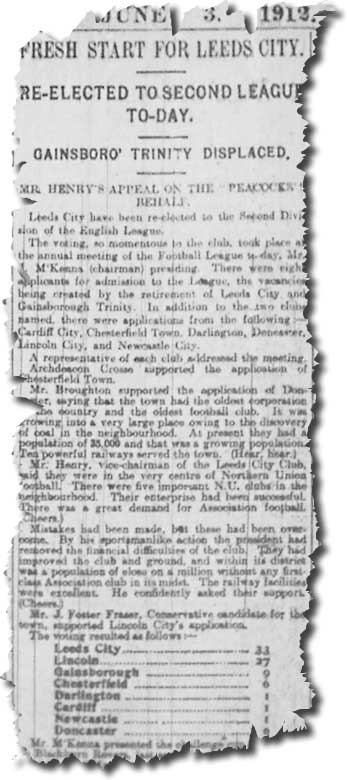 facilities are excellent. I confidently ask your support (Cheers).'
facilities are excellent. I confidently ask your support (Cheers).'
At no time was there a genuine doubt that City would be voted back in.
The Yorkshire Post had claimed bullishly, 'No doubt is held that
... re-election would be forthcoming.' The outcome was emphatic: Leeds
finished top of the poll with 33 votes and were duly welcomed back into
the League fold, along with Lincoln City (27). Gainsborough (9) and Chesterfield
(6) enjoyed some support, but Darlington, Cardiff, Newcastle and Doncaster
got just three votes between them.
back to top
The Yorkshire Evening Post acknowledged that 'it was rather a
humiliation for Leeds City to have to apply for re-election,' but crowed
that the outcome of the voting heralded a 'fresh start'.
There were other equally pressing matters for the board to address
as they sought desperately to resolve their grim financial position;
the club held an extraordinary general meeting on August 19 in
the Salem Hall in the city centre. With a hall packed to the rafters
by City shareholders, Joe Henry presided in the absence of Norris
Hepworth.
At the start of the previous season, it had been announced that
the club owed £10,733 to Hepworth and were groaning under total
debts of £13,297. Schemes to raise funding had been proposed by
the board, but shareholders had not been supportive, seeking the
opportunity to make alternative proposals, but none had been found
acceptable.
The current parlous state of affairs had been provoked in March, when
the club's bankers decided to call in City's £7,000 overdraft, prompting
them to go into receivership. Hepworth appointed the
incorporated accountant Tom Coombs, of 14 King Street, as 'receiver
on behalf of the debenture holders of the Leeds City Association Football
Club Company Limited ... Under the appointment all the assets of the club
will now belong to Mr Coombs, on behalf of the debenture holders, to whom
all moneys must be paid and without whose authority no money belonging
to the club can be paid.' Coombs was to manage the club's financial affairs
for the next three years.
City held a public meeting at the Grand Central Hotel on 19 April
1912, revealing that the club had incurred total losses of £11,321
since their formation and only been able to keep going on the
back of Hepworth's altruism. By now his total investment had soared
to £15,000.
Coombs reported on the club's financial standing: in total, including
subscribed share capital, liabilities amounted to £15,782 5s 10d.
Of the assets, around £7,000 related to expenditure on the Elland
Road stadium and ground, which would be worth little if the club
ceased to exist. This left their liquidity badly holed beneath
the surface, plugged only by the generosity of the chairman, who
had poured £15,000 into the club over the years. It was clear
that a more permanent solution had to be found, as even Norris
Hepworth's pockets were not bottomless.
Shareholders were asked to consider a resolution which would
effectively bring the existing receivership arrangement to an
end and see the company liquidated. This would allow for the discharge
of existing debts and the establishment of a new company with
a nominal capital of £7,000, consisting of one thousand preference
shares and 6,000 ordinary shares, each of £1. In addition £9,000
worth of debentures would be issued in order to allow existing
liabilities to be settled.
Director Alf Masser, after paying tribute to the 'businesslike way' in
which Coombs had tackled the club's financial problems, raised a note
of caution. He spoke of the significant operating expenses (£2,500) that
had been incurred since the preparation of the balance sheet and said
that he would have much preferred it if the company had sought to issue
a larger number of preference shares in order to increase working capital.
Nevertheless, Masser moved the resolution to wind up the company and appoint
Coombs as official liquidator.
There then came an intervention from the floor. Outgoing manager Frank
Scott-Walford, who remained a shareholder, noted that he was a guarantor
to the level of £2,000, and asked how liquidation would affect his position.
Coombs confirmed that Scott-Walford and Norris Hepworth stood as joint
guarantors on a personal account with the bank, but that this had nothing
to do with the club. To discharge the matter, Scott-Walford needed only
to sign a cheque relating to the Bradford-Barnsley Cup replay earlier
in the year at Elland Road, which would 'free a sum of money due to the
Leeds City Club'.
Thus appeased, Scott-Walford seconded the resolution, which was duly
carried. Joe Henry 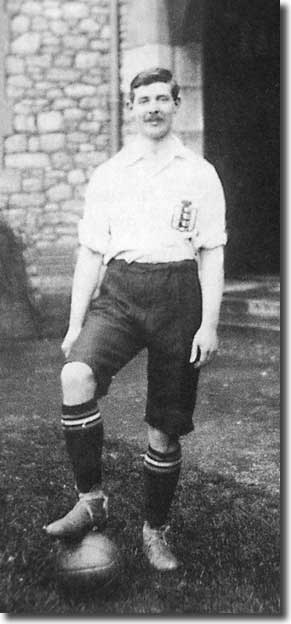 assured
the meeting that there was 'a brighter future for the club' and 'a better
feeling in the city towards it'. Regarding Alf Masser's plea for more
new funding, Henry asserted his belief that 'it would be better to come
for more capital when the club had proved its success ... There is a determination
to have a thoroughly good team.'
assured
the meeting that there was 'a brighter future for the club' and 'a better
feeling in the city towards it'. Regarding Alf Masser's plea for more
new funding, Henry asserted his belief that 'it would be better to come
for more capital when the club had proved its success ... There is a determination
to have a thoroughly good team.'
Herbert Chapman was working tirelessly in pursuit of that latter
aim. He had a significant task, for City had won just one of their
previous 11 games and players' confidence was low.
Chapman had an instinctive feel for what was needed, reasoning
that success was most likely to be achieved by the club recruiting
proven performers. Scott-Walford's strategy had been founded on
enlisting inexpensive unknowns, many of them from across the Irish
Sea, and gambling on their potential. In contrast, Chapman's recruits
were intended to bring immediate improvements.
back to top
It was clear where the team's difficulties lay - 78 goals had
been conceded, far and away the highest total in the division,
and the manager knew he had to reinforce his defence. Among a
number of recruits, Chapman signed three internationals to bolster
the porous rearguard.
Evelyn Lintott, the Bradford City centre-half, was born in Godalming
in November 1883. While with Woking and Plymouth Argyle he won England
amateur caps, playing alongside the legendary Vivian Woodward. In 1907
he joined QPR, helping them to win the Southern League the following season.
Despite retaining his amateur status, Lintott made his full England debut
in February 1908, going on to make seven appearances. Later that year,
Lintott turned professional and was sold to Bradford for £1,000. He was
the first chairman of the Association Football Players Union (later the
PFA) and a schoolteacher, while his brother was a reporter with the Bradford
Daily Telegraph, going by the pen name of Preceptor.
Goalkeeper Billy Scott, 28, was the older brother of Liverpool custodian
Elisha. Chapman signed him from Everton, with whom he won the FA Cup in
1906; he also helped them finish championship runners up on three occasions.
He was awarded the first of 25 Irish caps in 1903 and played 251 league
games for the Goodison club.
Rangers full-back George Law was the third international signed. He had
been a favourite with the Ibrox fans, winning 3 Scottish caps in 1910
and helping the 'Gers to the Scottish league title a year later.
The signing of the three men was not entirely straightforward,
involving some irregularities which brought a number of issues
with officialdom. Chapman had agreed to pay all three the full
yearly wage of £208 in order to persuade them to sign for City.
However, when they joined the club it was already two months since
the end of their previous contracts, meaning that they would be
receiving more than the maximum weekly wage of £4. There had already
been a number of similar cases, including a notable one involving
Aston Villa, and when Chapman identified the problem he persuaded
the City board to raise the matter with the Football League themselves
in the hope of lessening any punishment.
His gamble backfired badly and when the League commission met in October
they chose to levy the unexpectedly heavy sanction of a £125 fine, also
requiring City to meet the commission's expenses. They decreed that Chapman
and two of the players should be censured, and all three players were
required to refund their excess wages to the club. This saved City more
than £100 towards their fine. The commission made a point of formally
noting 'the straightforwardness of Mr Chapman in reporting the matter.
He adopted an honourable course, which is greatly to his credit and that
of the club.'
The three signings were typical of Chapman's approach - there
were to be few experiments. He was equally committed to clearing
the decks and released a host of players in a summer cull, convinced
they would never make the grade.
In the run up to the new season, there was a huge degree of optimism
in the city and its surrounding area, as exemplified by the Yorkshire
Evening Post: 'The Leeds City Football Club's prospects from a playing
point of view seem of the rosiest. The combination of talent gathered
together by Mr Herbert Chapman, the new manager, will probably be found
to be the strongest and best in the history of the club.'
To assist him with the task of getting City ready to compete,
Chapman had also brought in trainer Dick Murrell, who had worked
with him throughout his time at Northampton Town. It was all part
of Chapman's grand scheme to introduce a far more professional
attitude to all the club's operations. Murrell would remain at
Elland Road for more than a decade.
Scott, Law and Lintott (assuming the role of captain from the man he
replaced at centre-half, Tom Morris) were all on duty for the opening
match, away to Fulham on 7 September. Also on debut were Jock
Ferguson (a left-back signed from Dundee), John Allan (right-half,
Everton), Jimmy Robertson
(inside-right, Barrow) and Andy Gibson
(inside-left, Southampton). The rest of the team comprised Stan
Cubberley (who was reported to have put on "a lot of weight" during
the summer), 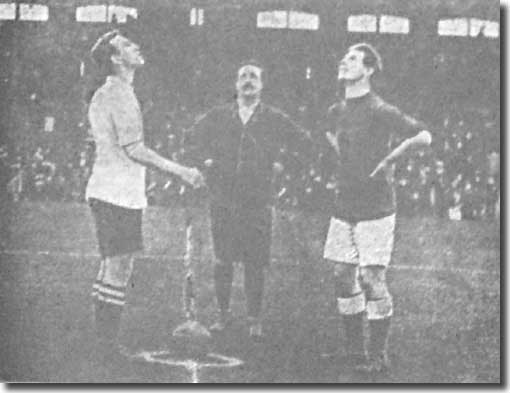 Hugh
Roberts, Billy McLeod and Fred Croot.
Hugh
Roberts, Billy McLeod and Fred Croot.
With such dramatic change, there was a degree of inevitability
about the outcome and City duly went down to defeat at Craven
Cottage, although the 4-0 scoreline was very disappointing.
The Londoners took the lead within a minute and that badly unsettled
City. Fulham were soon 2-0 ahead when Pearce was given an easy
opportunity after Walker beat Law in the air. The whistle went
for the interval with City four goals behind and in disarray.
The home side began to cruise after the resumption and there was
no further score; even though City got into the game they never
really threatened a goal.
back to top
The Yorkshire Post: 'Roberts and Croot on the wings made plenty
of openings ... Gibson made an admirable partner to Croot, but showed
a tendency to lie back a little too far ... Robertson played better in
the second half than in the first, and his judicious footwork should be
of much value to his side ... Lintott showed many good points, and effectively
proved that there is a lot of good football in him yet.
'Cubberley was as good as usual, and did some neat things against a very
clever wing ... but Allan did not look after his forwards so well as he
might have done. His defensive work was sound enough, however, and it
was as well it was, for Law was unsteady and slow ... The fact that Scott
was beaten four times must not be accepted as evidence of weakness on
his part. The first two goals were leavened with luck, and Coleman's shot
was practically unstoppable. The Irish international did some remarkably
good work and should render the City effective assistance. To sum up,
with a strengthening of the right-back position and an improvement in
Gibson's tactics, the City team should make a vastly better showing than
last season's combination in spite of their disastrous initial experience.'
They bounced back the following week with an enterprising 2-0
win against Cup holders Barnsley. The match was watched by a 15,000
Elland Road crowd, the best attendance in a year. Gibson was dropped
after his disappointing debut, but with Joe
Enright still unfit, Cubberley was switched to inside-left
and Mick Foley recalled at left-half.
The Yorkshire Post congratulated the City management on not being
panicked into wholesale change after the defeat at Fulham, reasoning that
it always takes time for a new combination to settle, but did acknowledge
that some modifications would be required: 'Changes in two or three departments
may be found necessary before a thoroughly balanced and capable combination
can be evolved ... The left full-back was slow and rather weak in kicking.
Neither outside-half distinguished himself ... Cubberley was not exactly
a failure at inside-left, but he lacked speed and incisiveness, and Croot
cannot hope to give his abilities full play until he decides to meet resolute
backs with equally resolute aggression. In other respects the team played
like a good, sound side. Scott was as fine in goal as ever he was for
Everton, and really made victory possible by the masterly way in which
he dealt with the Barnsley attacks in the first twenty minutes of play.
Law, too, was like the full-back that won for himself the highest honour
that Scotland can bestow; and Lintott, save possibly in the matter of
speed, reached more to his international level than he has done since
making his home in Yorkshire. McLeod got little help from his left wing,
but was well served by Roberts and Robertson ... The latter pair promise
to be more effective on the attack than any of their recent predecessors
in the City team.'
The match was a little disappointing but the 2-0 victory was
a fillip, always on the cards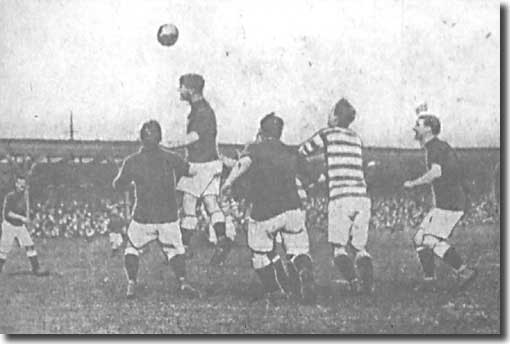 after Robertson gave City a 35th minute lead. Croot took a corner
he had forced himself and Allan headed on from fifteen yards out.
It fell to Robertson who scored in a flash. Fifteen minutes before
the final whistle, Croot made both points secure when he smashed
home a penalty awarded for hands.
after Robertson gave City a 35th minute lead. Croot took a corner
he had forced himself and Allan headed on from fifteen yards out.
It fell to Robertson who scored in a flash. Fifteen minutes before
the final whistle, Croot made both points secure when he smashed
home a penalty awarded for hands.
Chapman stuck by the same eleven a week later, away to Bradford
Park Avenue, and was rewarded when his men returned home with
a 1-0 win, thanks to "a beauty headed through by Cubberley after
pretty combination on the part of Lintott, McLeod and Roberts,"
according to the Leeds Mercury. Again, Lintott and Scott earned
critical acclaim.
Two draws followed, against Wolves and Leicester, and then two
goals from McLeod earned a 2-1 victory against Stockport County.
Things were developing nicely for Herbert Chapman, and the locals
were enthusiastic; the Wolves match drew a crowd of 20,000, the
club's best attendance for a League encounter in four years. Even
a 3-2 defeat at Preston on 19 October did nothing to dampen the
spirits, for City put on a strong display, recovering from falling
behind to a soft goal in the seventh minute. Leeds twice equalised
before losing to a third Preston goal which the visitors claimed
vehemently was offside.
The Peacocks swiftly returned to winning form by hammering Burnley 4-1,
as reported by JRB in the Leeds Mercury.
'Leeds City delighted their supporters not merely by defeating Burnley
at Elland Road, but by the brilliant manner in which they rallied in the
latter portion of the game.
'Although (McLeod) did not actually score, the home centre-forward was
responsible for Leeds City's first goal. Robertson was the scorer. He
had only to tap the ball after Drabble repelled a shot from McLeod to
score, and this he did.
'Then came the brilliant rally by Leeds City. Three goals in twenty minutes,
all of which were well-merited. Perhaps the best of these three goals
was the one registered by Robertson. He was clever in the manner he worked
his way between Taylor and Watson and scored. McLeod's turn came next.
Bamford, endeavouring to head away, gave Drabble an awkward shot to stop.
He fisted the ball away and then McLeod scored. The last and fourth goal
of the match came immediately afterwards. McLeod was again responsible
for it, although it was actually scored by Cubberley. It was the result
of one of the home centre-forward's clever runs, and although neatly done,
it was not such a well-earned goal as that of Robertson's or McLeod's.'
back to top
After such a promising run, it was sad to see City slump into
a period of startling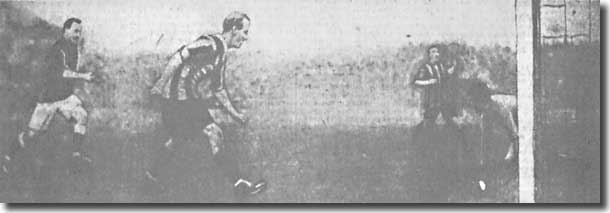 inconsistency, losing 6-2 at Hull City on 2 November, recovering
sharply to defeat Glossop 4-0 with a McLeod hat trick, then surrendering
by two goals away to Clapton Orient.
inconsistency, losing 6-2 at Hull City on 2 November, recovering
sharply to defeat Glossop 4-0 with a McLeod hat trick, then surrendering
by two goals away to Clapton Orient.
After a 2-2 draw at Elland Road against Lincoln City on 23 November,
JRB reported for the Mercury: 'I heard it said ... that the changes
made in the home team had proved successful. I do not think so ... Affleck
did not play as well with Copeland in the rear division as was anticipated,
and Cubberley at inside-left was by no means as good as he is at half-back.
Allan, too, was not a success in Cubberley's original position.
'The display given by the home team was not what it should or could have
been. Their combination of a fortnight ago was absent, and the shooting
of the forwards should have been improved upon ... With all their faults,
Leeds played with determination in the initial half of the game, and for
the major portion of the game did the attacking. But what opportunities
they missed! In turn each forward was presented with a chance of scoring,
but either erratic shooting or hesitation spoilt their attacks. Roberts,
at outside-right, was chief offender in this respect.
'Leeds were triers, and deserved the goal they secured through Robertson
just before the interval. It was in the getting of this goal that Cubberley
did his best piece of work during the afternoon. He headed the ball against
the crossbar in a very clever manner, the result being that from the rebound
Robertson had only the goalkeeper to beat to score.'
Lincoln scored in the first minute of each half and on both occasions
Billy Scott should have prevented the goal. On the second occasion,
in particular, he seemed to make no serious attempt to save the
effort, simply watching transfixed as it entered the net.
It was clear that Herbert Chapman had work to do if he wished to build
a side that was capable of challenging for promotion. The Yorkshire
Post emphasised the point. 'The present players will never blend,
as their styles are so dissimilar. Individualism is by no means to be
deprecated, but cohesiveness should be the first aim of an attacking line.'
Stephen Studd in Herbert Chapman Football Emperor: 'Disappointed
supporters demanded to know why Chapman had not signed any new players
since the summer. It was not, he answered, through want of trying: clubs
were either unwilling to sell so early in the season, or were asking too
high a fee. Even junior clubs were holding on to their players. It would
not, he admitted, be hard to find players who were "fairly good",
but they would not strengthen the team; nothing but the best would do.
Then in November came a golden opportunity.
'Northampton Town, languishing since Chapman's departure and losing money
at the rate of £30 a week, were open to offers for Fanny
Walden. Chapman jumped at the chance, but the Cobblers' supporters
were determined that Walden should stay, and a "shilling fund"
was set up to thwart the designs of their former manager. It worked, and
by the end of the month the deal was off.'
Walden was an astounding talent and the star of Chapman's Northampton
team, known for his 'darting, jinking runs down the right flank'. He may
have stood just 5ft 2in, but he was a footballing wizard, later finding
fame with Tottenham and England. He also played County cricket for Northamptonshire.
Chapman confessed, 'In no instance have I personally suffered so great
a disappointment.' He remained hopeful of securing Walden in the future,
for he 'would be the making of the Leeds City team if only I could get
him to Elland Road'.
Thus denied, Chapman did manage to get at least some measure of compensation
by taking a young 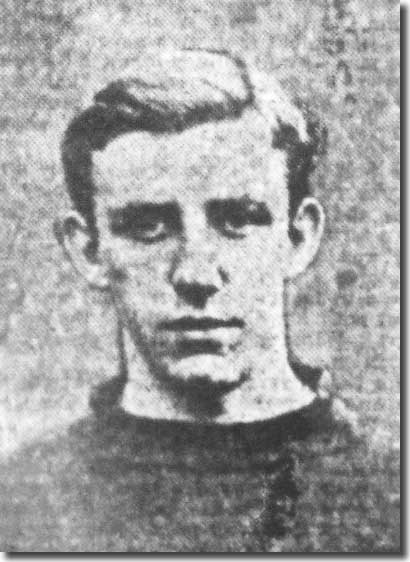 outside-right
called Simpson Bainbridge on trial from Seaton Delaval. Following a series
of poor performances by Hugh Roberts, Chapman gave Bainbridge his debut
on 7 December against Bristol City. The week before, City had won 2-1
at Nottingham Forest and, despite Roberts scoring in the game, it was
clear that he had regressed significantly since his outstanding form of
the previous campaign. The Leeds Mercury claimed that, 'He has yet to
show that he is the Roberts of old,' while the Yorkshire Post noted
that he 'showed no general improvement in his play.'
outside-right
called Simpson Bainbridge on trial from Seaton Delaval. Following a series
of poor performances by Hugh Roberts, Chapman gave Bainbridge his debut
on 7 December against Bristol City. The week before, City had won 2-1
at Nottingham Forest and, despite Roberts scoring in the game, it was
clear that he had regressed significantly since his outstanding form of
the previous campaign. The Leeds Mercury claimed that, 'He has yet to
show that he is the Roberts of old,' while the Yorkshire Post noted
that he 'showed no general improvement in his play.'
The Yorkshire Post described the win at Forest as City's 'best
performance of the season. It was not a victory that the team or their
friends had any solid reason for anticipating ... Certainly the prospect
of success seemed very unlikely when the City had a goal scored against
them in the first minute of play. It is a strange fact that in three successive
matches Scott, the City custodian, has been beaten four times within a
minute of a kick off. All goalkeepers are, of course, liable to be taken
by surprise but it really was want of alertness that caused Scott to be
beaten at the very opening of last Saturday's engagement.'
Despite the victory and Roberts' goal, Chapman was sorely tried by the
winger's lack of application and resolution; he had decided that enough
was enough. Roberts never got another chance in a City shirt. Chapman
had already decided that if Bainbridge came up to scratch then he would
invite offers for the Welshman. The manager had no hesitation in throwing
Bainbridge into the fray against redoubtable opponents.
back to top
The youngster was an instant success against Bristol, as reported by
the Yorkshire Post. 'Much local interest centred round Bainbridge
... It was quite a relief to see a player in that position with skill
sufficiently pronounced to justify a lengthy trial, as Bainbridge undoubtedly
possesses merit beyond the ordinary. He played with judgement, kept his
place and shot accurately. His appearance upon the scene may save the
club hundreds of pounds.' The Evening Post enthusiastically declared
the young winger 'the catch of the season'.
Bainbridge did just as well the following week in a 2-2 draw
at Birmingham with McLeod getting both goals, one of them coming
from an astute centre by the winger. McLeod's first effort brought
up his century of League goals in City colours, a landmark for
a great servant.
Leeds City were now well placed to mount a genuine promotion
challenge; they were eighth, just six points off the leaders and
enjoying matches in hand on most of the teams around them. With
four successive home games to come before the end of the year
there were high hopes that the Peacocks could catapult themselves
right into the thick of things. City had not tasted defeat at
Elland Road since the end of March and expected to continue the
run when they hosted Huddersfield Town on 21 December. Inexplicably,
however, they could not find their form and were on the wrong
end of a 3-0 reverse.
Yorkist in the Leeds Mercury: 'The opening stages of Saturday's
game did not suggest that defeat was in store for Leeds City, as they
began in sparkling style. It looked as if Huddersfield Town were going
to be run off their feet. In the end, however, it was Leeds City who were
run off their feet ... Huddersfield Town led by a goal to nil at the interval,
and they certainly deserved their lead, for they were undoubtedly the
better side fore and aft.
'It was thought the second half would see an improvement in Leeds City,
but this improvement did not come, whereas Huddersfield Town played even
better football than in the opening half. There were only three men on
the Leeds City side who played up to anything like form, and these were
Foley, Bainbridge and Croot.'
The shocks continued as Grimsby won 2-1 on Christmas Day and
Blackpool by two goals to nil the next day. Herbert Chapman could
be excused for feeling downhearted at this turn of affairs, but
had some positive 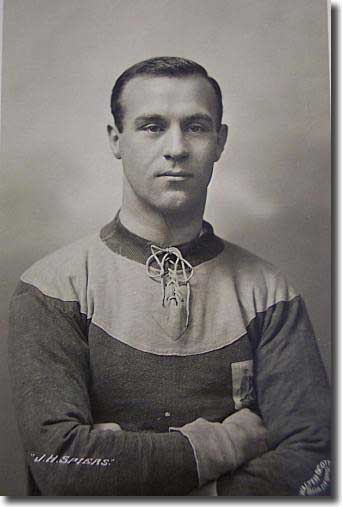 news
to sustain his morale. He had remained on the look out for new
talent and enjoyed some notable success in the transfer market
during the festive period.
news
to sustain his morale. He had remained on the look out for new
talent and enjoyed some notable success in the transfer market
during the festive period.
One of his new signings, inside-forward Arthur Price from Worksop
Town, was an unknown, but the other was a celebrated and highly
regarded talent.
Leeds set a new club record when they paid Bradford City £1,400
for their captain and inside-left, Jimmy Speirs. His goal against
Newcastle United in an Old Trafford replay had won the Bantams
the FA Cup in 1911 and Speirs had won a Scottish cap during his
earlier days at Rangers. He was a renowned and gifted inside-forward
and certainly the closest thing to the finished article that Leeds
City had ever signed.
The player had a reputation of stellar proportions and was a totemic
figure at the Bradford club. However, following the Cup success he had
grown disaffected with the regime at Valley Parade and Chapman, who had
been following events closely across West Yorkshire, leapt into action
at just the right time. He was eloquent in the arguments he put to the
player and quickly persuaded Speirs that his future lay at Elland Road.
The Yorkshire Evening Post reported, 'The enterprise of the Leeds
City management in securing Speirs would have staggered those responsible
for the club a few years ago.'
Speirs was signed on 27 December and went straight into the City team
the next day against Fulham. Arthur Price was a second debutant and Simpson
Bainbridge continued to ply his trade down the right flank. Both these
latter two scored and Speirs made a great impression, being 'responsible
for many fine passes and shots, but he was inclined to wander from his
position. Price delighted the spectators and, together with Bainbridge,
made a capital right wing,' according to the Leeds Mercury.
City worked themselves into a 2-1 lead, but the Londoners fought
back to win 3-2, thanks mainly to late errors by full-backs Copeland
and Ferguson. It was disappointing, but the new arrivals had done
enough to give long suffering locals genuine hope that fortunes
might improve in 1913.
Chapman promised when he arrived at Elland Road that he would get City
promoted within two seasons; his initial aim had been to finish this first
campaign in the top five, allowing the club to benefit from the newly
introduced 'talent money'. Their run of defeats in December had seen them
slump to 15th, reversing the upward trend of the autumn, but the new manager
remained confident it would not take long to turn City's fortunes around.
The signing of Speirs was a master stroke and the Scot had the necessary
class to transform a lacklustre Second Division side into genuine title
contenders.
Part 2 - Results
and table
Other Football Highlights from 1912/13
- Sunderland won the league championship with a record number of points,
54, after gaining only two from their first seven games
- The North East club failed to win the Double, however, when championship
rivals Aston Villa beat them 1-0 before a record crowd of 120,081 in
the FA Cup final at Crystal Palace
- England lost to Ireland for the first time in an international, going
down 2-1 in Belfast. Former Leeds centre-forward Billy
Gillespie, who moved to Sheffield United in December 1912, scored
both goals for an Irish side reduced to ten men. The result didn't prevent
the Home International title going to England, however
- Rangers completed a hat trick of league titles in Scotland
back to top












 facilities are excellent. I confidently ask your support (Cheers).'
facilities are excellent. I confidently ask your support (Cheers).' assured
the meeting that there was 'a brighter future for the club' and 'a better
feeling in the city towards it'. Regarding Alf Masser's plea for more
new funding, Henry asserted his belief that 'it would be better to come
for more capital when the club had proved its success ... There is a determination
to have a thoroughly good team.'
assured
the meeting that there was 'a brighter future for the club' and 'a better
feeling in the city towards it'. Regarding Alf Masser's plea for more
new funding, Henry asserted his belief that 'it would be better to come
for more capital when the club had proved its success ... There is a determination
to have a thoroughly good team.' Hugh
Roberts, Billy McLeod and Fred Croot.
Hugh
Roberts, Billy McLeod and Fred Croot. after Robertson gave City a 35th minute lead. Croot took a corner
he had forced himself and Allan headed on from fifteen yards out.
It fell to Robertson who scored in a flash. Fifteen minutes before
the final whistle, Croot made both points secure when he smashed
home a penalty awarded for hands.
after Robertson gave City a 35th minute lead. Croot took a corner
he had forced himself and Allan headed on from fifteen yards out.
It fell to Robertson who scored in a flash. Fifteen minutes before
the final whistle, Croot made both points secure when he smashed
home a penalty awarded for hands. inconsistency, losing 6-2 at Hull City on 2 November, recovering
sharply to defeat Glossop 4-0 with a McLeod hat trick, then surrendering
by two goals away to Clapton Orient.
inconsistency, losing 6-2 at Hull City on 2 November, recovering
sharply to defeat Glossop 4-0 with a McLeod hat trick, then surrendering
by two goals away to Clapton Orient. outside-right
called Simpson Bainbridge on trial from Seaton Delaval. Following a series
of poor performances by Hugh Roberts, Chapman gave Bainbridge his debut
on 7 December against Bristol City. The week before, City had won 2-1
at Nottingham Forest and, despite Roberts scoring in the game, it was
clear that he had regressed significantly since his outstanding form of
the previous campaign. The Leeds Mercury claimed that, 'He has yet to
show that he is the Roberts of old,' while the Yorkshire Post noted
that he 'showed no general improvement in his play.'
outside-right
called Simpson Bainbridge on trial from Seaton Delaval. Following a series
of poor performances by Hugh Roberts, Chapman gave Bainbridge his debut
on 7 December against Bristol City. The week before, City had won 2-1
at Nottingham Forest and, despite Roberts scoring in the game, it was
clear that he had regressed significantly since his outstanding form of
the previous campaign. The Leeds Mercury claimed that, 'He has yet to
show that he is the Roberts of old,' while the Yorkshire Post noted
that he 'showed no general improvement in his play.' news
to sustain his morale. He had remained on the look out for new
talent and enjoyed some notable success in the transfer market
during the festive period.
news
to sustain his morale. He had remained on the look out for new
talent and enjoyed some notable success in the transfer market
during the festive period.